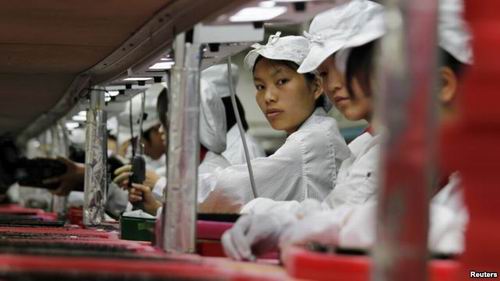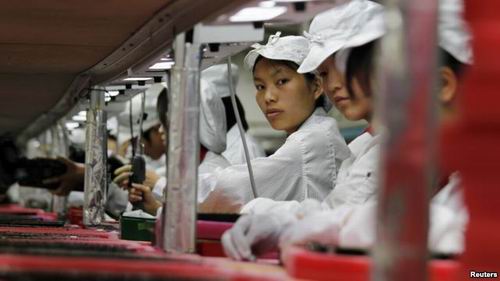VOA慢速英语: 机器人制造iPad 和 iPhone
- 参考译文
- 听力原文
Robots to Make iPads and iPhones
 |
|
In this 2010 file photo, workers assemble electronics in a Hon Hai, also known as Foxconn, factory in southern Guangdong province May 26, 2010. The factory is a main supplier for Apple's products. |
机器人制造iPad 和iPhone手机
The Hon Hai company is based in Taiwan and operates factories in China. The U.S. company Apple and other top electronic brands hire Hon Hai to make products, including iPads and iPhones.
鸿海集团总部设在台湾,工厂设在大陆。美国的苹果公司和其它一些顶级电子品牌公司用鸿海集团来生产产品:其中包括iPad 和iPhone手机。
The CEO of Hon Hai is Terry Gou. Mr. Gou recently told reporters that Hon Hai is replacing 70 percent of its manufacturing process with an automaticsystem. He says machines will do most of the work that people do now. Mr. Gou expects the changes to be finished in three years.
郭台铭是鸿海集团的CEO。日前他对记者表示:鸿海集团正在用自动化系统取代70%的制造过程。机器能够做大多数人现在做的活儿。他希望在未来三年内完成改变。
Jamie Wang is a researcher with a business in Taipei that studies markets. She says using robots is an increasingly common change in manufacturing. Even the popular company Apple is planning to depend more on robots, she says. So, she says, manufacturers like Hon Hai must keep up with the market and reduce their costs.
王女士是台北研究市场动态的研究员。她表示:使用机器人在工厂是越来越普遍的现象,甚至是苹果公司也在计划更多地依靠机器人。她表示像鸿海集团这样的制造商必须紧跟市场脚步,降低成本。
Using robots may also reduce Hon Hai's risk of labor disputes. In the past five years, some workers in Hon Hai's Chinese factories have protested workplace conditions and even killed themselves. The events have damaged the company. Now, fewer workers are depending on Hon Hai for jobs.
使用机器人同样会减少鸿海集团的劳资纠纷风险。过去五年里,鸿海集团大陆工厂的一些工人抗议工作条件太差,员工甚至自杀。该事件损害了公司形象,现在越来越少的工人选择去鸿海集团工作。
Geoff Crothall is a spokesman for the China Labor Bulletin advocacy group in Hong Kong. He says people are no longer forming long lines to try to work in factories. He says some Chinese workers are staying in school longer and seeking higher levels of education. Others are simply finding better jobs in other places.
杰夫·克罗塞尔是香港倡议团体—“中国劳工通讯”的发言人。他表示:人们不再排长队在工厂门口找工作。一些中国工人待在学校的时间更长,接受更高水平的教育。而其他一些人则在别的地方找到更好的工作。
Changes in China
中国发生的变化
Companies such as Hon Hai are also facing rising wagesfor factory work in China. Those wages rose 13 percent in 2014.
一些公司比如鸿海集团面临大陆工人涨薪的问题,2014年,工资涨了13%。
At the same time, the cost of living in eastern China is increasing. Some workers are moving to less expensive but less developed cities. And, foreign investments, especially in manufacturing, are slowing. Direct investments grew at only two percent last year.
与此同时,在中国东部的生活成本增加。一些工人搬到生活成本相对较低、不发达的城市。而且外资的投资,特别是对于工厂的投资正在减少。去年,直接投资只增长了2%。
Liang Kuo-yuan is chairman of the Yuanta-Polaris Research Institute in Taipei. He says companies as large as Hon Hai need to bring more machines into their manufacturing process. He says the company must move toward automatic systems as costs rise and the number of workers drops.
梁国源是台北元大宝华综合经济研究院的院长,他表示,随着成本的增加和工人数量的下降,像鸿海集团这样的大公司需要将机器引入到制造过程中,公司必须向着自动化方向发展。
Hon Hai refused VOA requests for details on its plans. But the company has said it hopes to grow in the United States. It also says it wants to open a $1 billion research and development center in Indonesia.
鸿海集团拒绝向美国之音记者透漏其计划,但是公司表示,他们希望在美国能够扩大业务,还希望能够在印度尼西亚创办一个价值10亿美元的研究和发展中心。
I'm Kelly Jean Kelly.
我是凯利·简·凯利。
Ralph Jennings reported this story for VOA from Taipei, Taiwan. Kelly Jean Kelly wrote it for Learning English. Caty Weaver was the editor.
______________________________________________________________
Words in This Story
automatic – adj. having controls that allow something to work or happen without being directly controlled by a person
robots – n. machines that can do the work of a person and that work automatically or are controlled by computers
labor – n. workers as a group
wages – n. money a worker is paid based on the amount of time he or she has worked
 |
|
In this 2010 file photo, workers assemble electronics in a Hon Hai, also known as Foxconn, factory in southern Guangdong province May 26, 2010. The factory is a main supplier for Apple's products. |
The Hon Hai company is based in Taiwan and operates factories in China. The U.S. company Apple and other top electronic brands hire Hon Hai to make products, including iPads and iPhones.
The CEO of Hon Hai is Terry Gou. Mr. Gou recently told reporters that Hon Hai is replacing 70 percent of its manufacturing process with an automatic system. He says machines will do most of the work that people do now. Mr. Gou expects the changes to be finished in three years.
Jamie Wang is a researcher with a business in Taipei that studies markets. She says using robots is an increasingly common change in manufacturing. Even the popular company Apple is planning to depend more on robots, she says. So, she says, manufacturers like Hon Hai must keep up with the market and reduce their costs.
Using robots may also reduce Hon Hai's risk of labor disputes. In the past five years, some workers in Hon Hai's Chinese factories have protested workplace conditions and even killed themselves. The events have damaged the company. Now, fewer workers are depending on Hon Hai for jobs.
Geoff Crothall is a spokesman for the China Labor Bulletin advocacy group in Hong Kong. He says people are no longer forming long lines to try to work in factories. He says some Chinese workers are staying in school longer and seeking higher levels of education. Others are simply finding better jobs in other places.
Changes in China
Companies such as Hon Hai are also facing rising wages for factory work in China. Those wages rose 13 percent in 2014.
At the same time, the cost of living in eastern China is increasing. Some workers are moving to less expensive but less developed cities. And, foreign investments, especially in manufacturing, are slowing. Direct investments grew at only two percent last year.
Liang Kuo-yuan is chairman of the Yuanta-Polaris Research Institute in Taipei. He says companies as large as Hon Hai need to bring more machines into their manufacturing process. He says the company must move toward automatic systems as costs rise and the number of workers drops.
Hon Hai refused VOA requests for details on its plans. But the company has said it hopes to grow in the United States. It also says it wants to open a $1 billion research and development center in Indonesia.
I'm Kelly Jean Kelly.
Ralph Jennings reported this story for VOA from Taipei, Taiwan. Kelly Jean Kelly wrote it for Learning English. Caty Weaver was the editor.
______________________________________________________________
Words in This Story
automatic – adj. having controls that allow something to work or happen without being directly controlled by a person
robots – n. machines that can do the work of a person and that work automatically or are controlled by computers
labor – n. workers as a group
wages – n. money a worker is paid based on the amount of time he or she has worked
- 频道推荐
- |
- 全站推荐
- 推荐下载
- 网站推荐




















